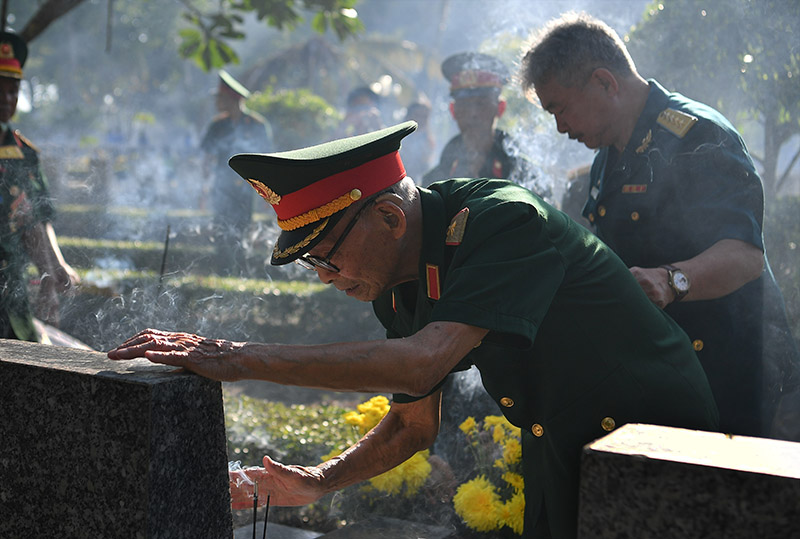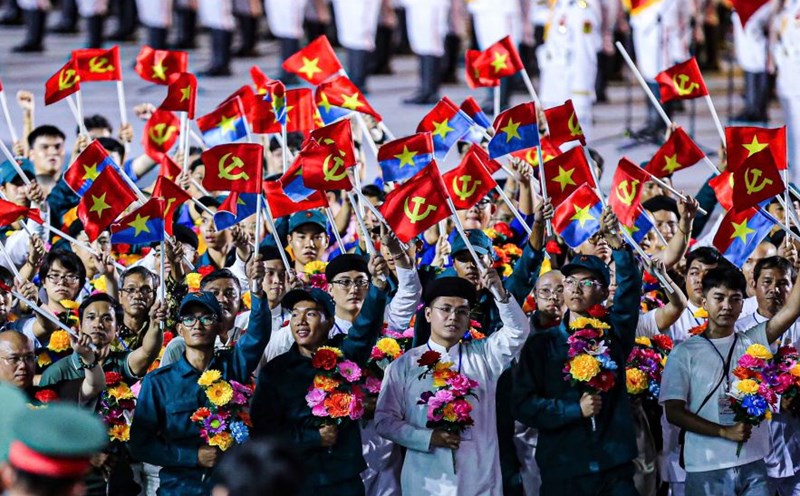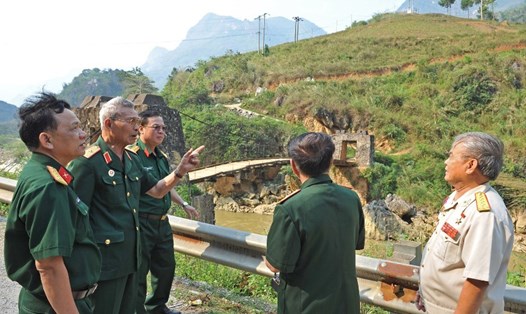Major General Nguyen Duc Huy, born in 1931, former Deputy Commander and Chief of Staff of Military Region 2, Deputy Commander of Division 325, participated in the resistance war against France, the US and the war at the northern border.
In the book Valley Vets II - an oral history by author William L. Adam (USA) about the Vietnam War, there is a chapter mentioning General Huy and calling the main army division F.225 that he commanded as Gio Dong Division to talk about his military talent. He participated in the historic Ho Chi Minh campaign, as Deputy Commander of Division 325, Army Corps 2.
Your biggest emotion at the moment Saigon was liberated?
In the historic Ho Chi Minh campaign, I participated in commanding forces from the Southeast, coordinating to enter the inner city. At noon on April 30, when we heard the news of the liberation flag flying on the top of Dinh Doc Lap, our emotions burst into tears. I think of my hometown, of my mother waiting for news of her children for many years, think of millions of families that have endured separation. And I know that from that day on, my nation has truly become one.
After 50 years, what memories of the historic Ho Chi Minh campaign still touch you every time you remember them?
The most memorable time was at the Liberation Palace, like a dream because I didn't think the campaign would be so quick. On March 29, we were still in Da Nang, nearly 1,000 kilometers away from Saigon. So at around 2:00 p.m. on April 30, we set foot in the Golden Eagle Palace.
From the Viet Bac battlefield to the fierce battles in Khe Sanh, Road 9 in Southern Laos, and the peak of the Ho Chi Minh campaign, he witnessed and directly participated in important historical periods of the nation. In your opinion, which quality is the most important for a military commander, especially in the life-and-death moments of war?
The commander must not only be brave but also be consulted and commanded promptly to change the playing style to suit. The Long Thanh battle was initially "fast, fast".
But when the enemy stopped, the damage was too great. The commander must change the way he plays to be effective, moving to "beating wherever he is", liberating Long Thanh. Or the liberation of Da Nang, Division 325, in the North direction I directly commanded.
On March 27 and 28, Lang Co was occupied, but at that time we did not have strong firepower, only 120 cups of sticks. By the morning of the 29th, the 2nd Corps Command had sent tanks to increase their firepower and high mobility. The enemy was confused when seeing tanks.
I did not use a firing method but used firepower to fire short, letting the soldiers sit on a tank, leaping in to attack Hai Van Pass. At 5am, fireworks were fired, at 10am they entered the city center, at 1:30pm they entered the Son Tra peninsula port army and won, liberating the entire city of Da Nang.

He has repeatedly emphasized: Comradeship in war is the most noble. Can you give some evidence?
Once, while I was checking the situation on the battlefield in Khe Sanh, the enemy discovered firecrackers pointing at the bombed-out rocket plan.
I jumped into the traffic register, looking for a place to hide, immediately a soldier jumped out to hug me, pushed me into the basement and lay outside to protect me, not caring who I was. Only our army has soldiers ready to sacrifice for our comrades like that.
In 1967, I also buried a comrade - Captain Nguyen Danh Ngoc, Chief of Staff of Regiment 9B - who died in Laos, west of the Se Pon River.
30 years later, after retiring, I spent time in Laos to search for the remains of old comrades to collect at the martyrs' cemetery. That is the responsibility of the living towards the person who sacrificed.
Have you ever thought that in war, both sides can respect each other?
30 years of liberating Khe Sanh, a group of American veterans who were in Quang Tri from 1961 to 1973, returned to Khe Sanh to visit the ancient battlefield. They wanted to put the past behind them to look forward to the future and invited me to talk.
They asked us why they beat us. I clearly stated: Although the forces of the gentlemen in Khe Sanh are very strong, we won because we fought for justice, for the desire for independence, freedom and national unity.
Although our generals were not trained at prestigious schools in the world like them, they were knowledgeable about the battlefield, understanding the tactics of battle, knowing when to surround and when to encroach.
In the end, the men mistakenly thought that they were fighting the liberation army with only a few tens of thousands of soldiers, but it turned out to be against the entire Vietnamese people and the world people supporting Vietnam.
With extensive experience through fierce wars, in your opinion, which bone and bone lesson about war and peace is the most important that needs to be passed on to future generations, especially in the context of the world today still having many conflicts?
Young people, don't forget the past that your ancestors sacrificed to have today. Know how to value peace, understand that maintaining peace also requires courage and sacrifice, no less than going to battle. You should absorb, improve your knowledge, absorb the science and technology that the world has brought to develop a rich country.











